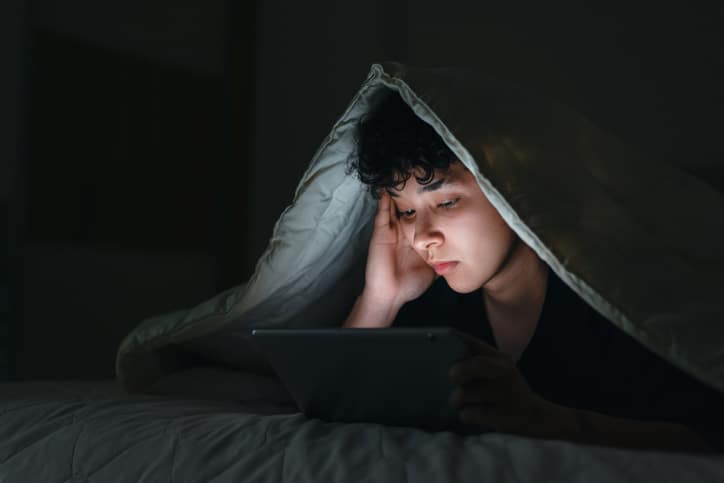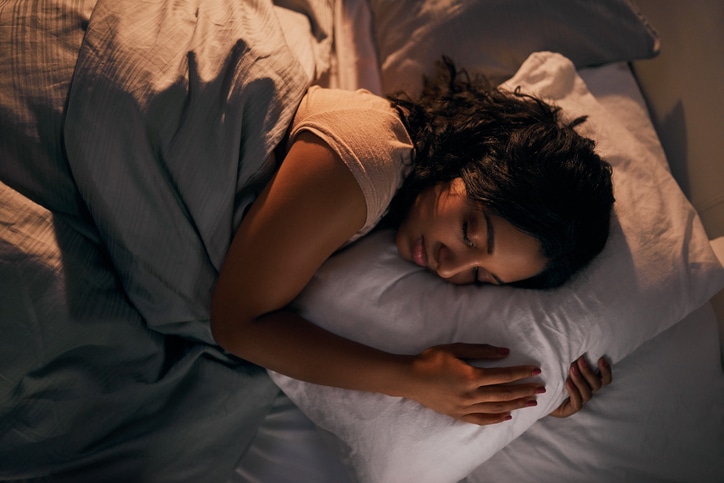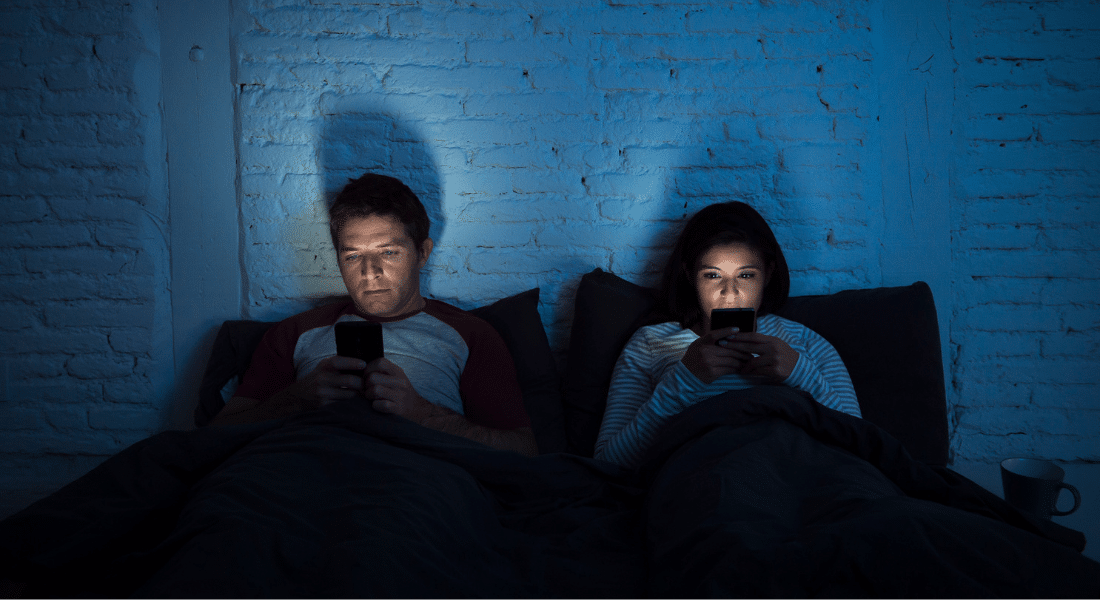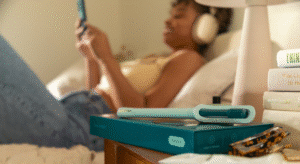Bedtime has a lot of competition these days, what with the proliferation of smartphones, streaming video, and social media, so it’s little wonder that we’re losing so much sleep.
One in three adults and more than half of teenagers and pre-teens are getting less sleep than the seven to 10 hours they need. And those estimates predate the pandemic, which wreaked havoc on the schedules of so many Americans.
Blame this epidemic of “bedtime procrastination” on the many entertainment options we have at our fingertips and our desire to take back some time to decompress at the end of a hectic day.
“These things are all enjoyable – I like them, too,” says Robert McMichael, MD, a neurologist on the medical staff at Methodist Mansfield Medical Center who specializes in sleep medicine. “But people need to know their limits and create time to do what they enjoy earlier in the night.”
That’s easier said than done for some people, whose genes predispose them to a different internal clock than their job dictates.
“They’re the people you would call night owls,” Dr. McMichael says. “They may feel just fine on their weekend schedule when they can stay up late and sleep in. But when the week starts again, they feel like dead meat.”
To break that cycle, Dr. McMichael has some advice for both the night owls and morning larks among us who want to improve the quantity and quality of our shut-eye.
“If you’re having trouble sleeping, you don’t need to fix one night,” he says. “You need to fix seven nights a week.”

MORE LIGHT, LESS SLEEP
For most of us, putting off bedtime began in childhood, when we inevitably wanted to be awake when we should be asleep. But once we reach adulthood, there’s no one there to enforce lights out.
In fact, light might be the biggest impediment to getting enough sleep.
“Our sleep cycle is strongly influenced by light and dark,” Dr. McMichael says. “Light suppresses melatonin, a hormone that helps regulate our internal clocks. And the bluish light on a glowing phone or tablet screen seems to have more of an impact.”
So when we lie in bed staring at Facebook or Netflix, we’re soaking up the very light that tells our internal clocks that it’s time to wake up. It’s no wonder our sleep quality suffers as a result.
Dr. McMichael suggests setting a bedtime routine that steers clear of stimulating activities like exercise or binging one more episode for calmer pursuits, say bedtime yoga, reading a book, or practicing mindfulness.
“Doing something that’s too exciting is not a good idea,” he says. “Do something that’s more relaxing.”
Some experts suggest plugging in personal electronics outside the bedroom. But if you can’t bear to leave your smartphone at arm’s length, think about setting a bedtime alarm in addition to your morning alarm. That way your internal clock will know it’s time to wind down.

THE ROLE OF GENETICS
But all the clocks in the world can’t compete with the countless clocks in our bodies. For some people those internal and external clocks are constantly out of sync, Dr. McMichael says.
“We’ve got this huge number of clocks throughout our body, every cell and every tissue,” he says. “But the most important one is the suprachiasmatic nucleus, the part of the brain that regulates our circadian rhythm and controls when we wake and sleep.”
Habit and behavior play a role when that internal clock gets out of whack. But so do genetics.
Some patients who visit Dr. McMichael for a case of insomnia are suffering from circadian rhythm disorders, of which there are a few varieties:
- Advanced sleep-wake phase disorder: These are the “early to bed, early to rise” crowd, but taken too far this sleep cycle can interfere with social responsibilities.
- Delayed sleep-wake phase disorder: These are the night owls who fall asleep later than they would like and have trouble waking up on time. They tend to get too little sleep and suffer from anxiety and tiredness during their waking hours.
- Irregular sleep-wake rhythm disorder: These are the chronic nappers who never feel fully rested after a night of sleep, so they resort to several short periods of sleep and wakefulness.
- Jet lag disorder: This disorder is temporary and should be familiar to anyone who has felt the effects of crossing multiple time zones in a short period.
- Non–24-hour sleep-wake rhythm disorder: Blind patients are especially prone to this disorder, where sleep-wake rhythms get more and more delayed, sometimes to the point where they go to sleep at noon rather than at night.
If any of these disorders strike a chord, consult a doctor because it’s no easy task to recalibrate an internal clock, especially when genetics are in play.
Dr. McMichael suggests setting a nightly routine that revolves around getting the sleep you need. In short, set yourself a bedtime, and stick to it — even on weekends, holidays, and vacations.
“First I ask patients to tell me what time they need to get up every single day of the week,” Dr. McMichael says. “Now let’s count back eight hours from that. And that’s your bedtime. You’re trying to establish a pattern that’s consistent.”
Try not to think of sleep as a chore but as a necessity, something to look forward to each night. Because you may be surprised how much your body is accomplishing during that downtime.

HARDLY A WASTE OF TIME
Not getting enough sleep has been linked to a host of health problems: including weight gain, increased blood pressure, and cholesterol levels, a higher risk of heart disease, and even some types of dementia.
“People who don’t get enough sleep have a shorter life expectancy,” Dr. McMichael says.
That’s because our organs are performing critical upkeep while we sleep, from consolidating memories and strengthening the immune system to building bone and muscle and regulating hormone levels.
“Lack of sleep raises adrenaline and cortisol levels, creating a cascade of biochemical effects in the body,” Dr. McMichael says. “When these stress hormones can’t power down long enough, it can lead to a host of health problems.”
So when a student studies all night long only to fail a test the following day, it’s because his brain never had a chance to file away those lessons properly. That fact-storing function comes during the three phases of non-REM sleep, while emotional processing happens during “rapid eye movement,” when dreams are formed.
“REM sleep is for emotional memories, how we relate to everybody else in the world,” Dr. McMichael says. “So that’s important to our mental health.”
Just like your smartphone, your body has a battery and sleep is its opportunity to recharge. Resist the temptation to put it off or your health might suffer.
“Sleep is not by any means wasting time because your brain is busy,” Dr. McMichael says. “To get a good night’s sleep, it’s important to consider the quality, not just the quantity, of hours slept.”






